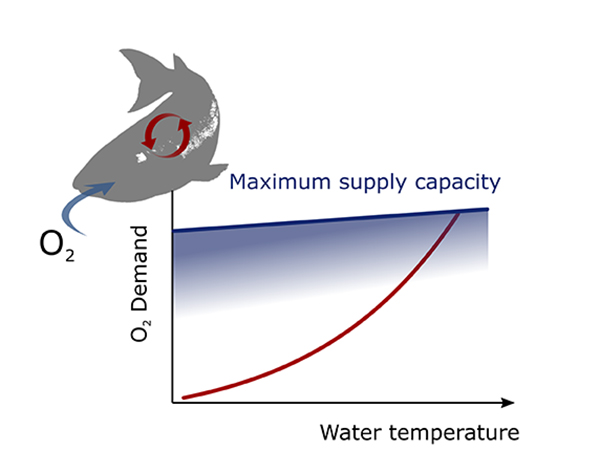Researchers Model Impacts of Warming Waters on Fish Physiology

In warming waters, the demand for oxygen of many fish species will increase, progressively approaching the maximum oxygen supply capacity of their respiratory organs. (Credit: Juan G. Rubalcaba)
MISSOULA –Scientists who study the impact of global warming on the health of aquatic populations have long speculated that rising water temperatures could reduce the ability of fish, particularly larger individuals, to breathe. However, it has been difficult to measure that impact on a large scale.
Now, researchers at the University of Montana, McGill University in Montreal and Radboud University in the Netherlands have developed a new mathematical model that accurately predicts how the metabolic rates of fish change with temperature, oxygen availability and body size. The team’s research was published in the Nov. 30 issue of the Proceedings of the National Academy of Sciences.
“This represents a significant theoretical addition to an important pre-existing body of theory – the metabolic theory of ecology – that focuses primarily on body size and temperature, but does not incorporate oxygen,” said Art Woods, UM professor of biological sciences. “Including oxygen means that the model does a significantly better job of predicting observed patterns of variation in metabolic rate among fishes worldwide.”
Contrary to warm-blooded animals such as mammals and birds, cold-blooded animals like fish increase their metabolic demand for oxygen with temperature increases. Water temperature already is rising worldwide as a consequence of climate change, and many fish species need to cope with this rapid temperature change either by migrating toward colder regions or by adopting different life strategies, such as growing smaller to avoid respiratory constraints.
“So far, our understanding of the mechanisms linking water temperature, respiratory performance, animal behavior and survival are limited,” said lead author Juan Rubalcaba, a Marie Curie Postdoctoral Fellow at McGill. “And these relationships are complex. For example, if warming increases oxygen uptake in fish, the water enveloping their gills will become depleted of oxygen, which in turn impedes oxygen uptake. Fish ventilate their gills, but the efficiency of this ventilation depends on water temperature and body size.”
To gain an improved understanding of how these mechanisms work, the research team developed a model based on physicochemical principles describing oxygen diffusion at the gill surface and oxygen consumption by metabolism. Predictions were compared against data from over 200 fish species, measuring oxygen consumption rates at different water temperatures and across individuals of different body sizes.
“Our model predictions matched our observations that aerobic capacity declines with increasing temperature, especially among larger individuals,” Rubalcaba said.
With this model, scientists will be able to better assess the impacts of global warming on fish metabolism and physiological performance. This will give them a more accurate prediction of the future health of the planet’s water bodies and the population of fish that inhabit them.
###
Contact: Art Woods, UM professor of biological sciences, 406-243-5234, art.woods@umontana.edu; Juan Rubalcaba, Marie Curie Fellow, McGill University, 438-778-1912, jg.rubalcaba@gmail.com.